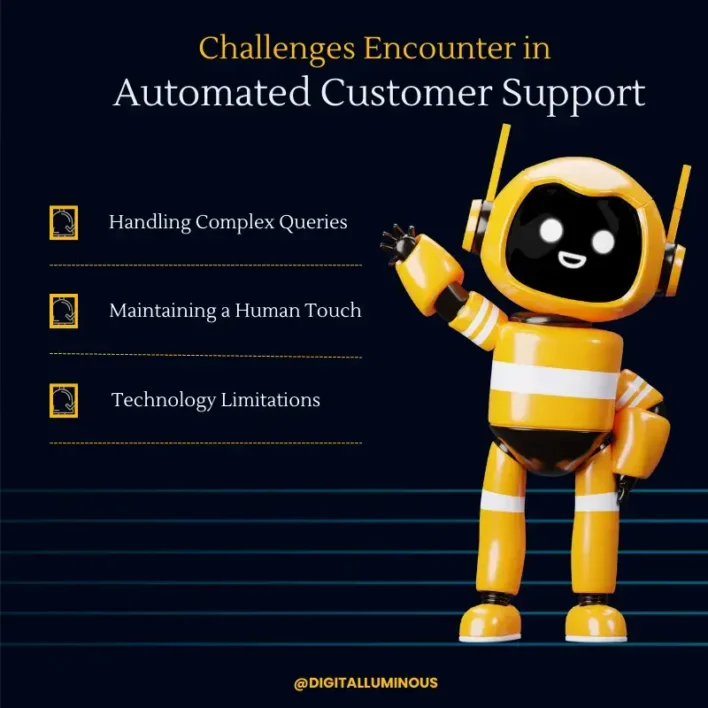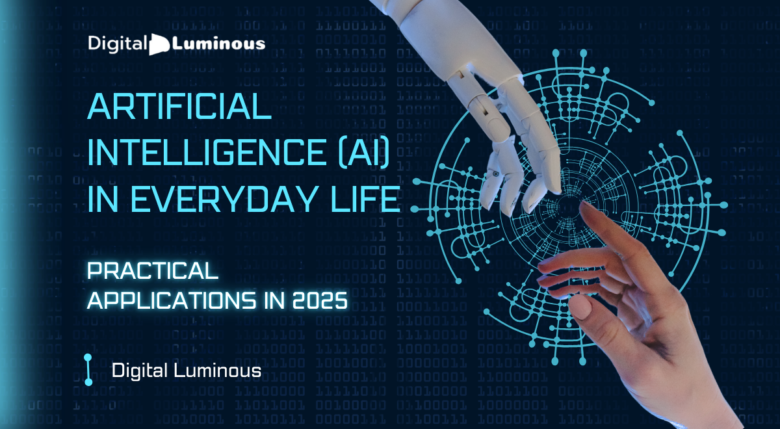
Have you ever found yourself waiting endlessly on hold when calling customer service, or sent an email only to receive a response days later?
In today’s fast-paced world, where convenience is king, customers expect prompt and efficient service. This is where AI-powered automated customer support steps in.
This innovative technology is changing the game, providing quick, consistent, and cost-effective solutions that keep customers happy and businesses thriving.
Let’s dive into how AI can transform your customer support experience.
What is AI-Powered Automated Customer Support?
AI-powered automated customer support utilizes artificial intelligence (AI) technology to handle customer inquiries and support tasks without human intervention.
This innovative approach employs chatbots, virtual assistants, and automated email responses to provide swift, consistent, and cost-effective solutions to customers’ needs.
By leveraging AI algorithms and natural language processing (NLP), businesses can automate routine support tasks, such as answering FAQs, processing orders, and resolving basic issues.
This not only enhances efficiency but also ensures round-the-clock availability, allowing customers to receive assistance anytime, anywhere.
AI-powered automated customer support is revolutionizing the customer service landscape, offering businesses a scalable and efficient solution to meet the demands of today’s digital consumers.
Benefits of AI-Powered Customer Support

Cost Savings
- Operational Efficiency: One of the most significant advantages of AI-powered support is its ability to reduce the need for a large customer service workforce. By handling routine inquiries and tasks, AI allows human agents to focus on more complex issues, leading to substantial cost savings.
- Scalability: As your business grows, so does the volume of customer interactions. AI solutions can effortlessly scale to manage increasing inquiries without proportional cost increases. This scalability ensures that your support system can handle peak times, such as holiday seasons, without compromising service quality.
- Return on Investment (ROI): Over time, the savings from reduced labor costs and increased efficiency result in a high ROI for businesses implementing AI-driven customer support. Companies often see a return within the first year due to the reduction in operational costs and improved customer retention.
Picture this: you're running a bustling online store in the USA, and it's the holiday season – cue the chaos! Your customer service team is overwhelmed with questions about shipping, returns, and product availability. Hiring more staff to handle the surge seems like the only solution, but that's a hefty expense. Enter AI chatbots! These digital assistants handle the routine stuff like order tracking, freeing up your team to tackle the trickier issues. Not only does this save on hiring costs, but it also ensures smooth sailing for your customers, leading to happier shoppers and healthier returns on your investment in AI.
Consistency
- Uniform Responses: Automated systems ensure that all customers receive accurate and consistent information, regardless of when or how they contact the company. This uniformity is crucial for maintaining a reliable brand image.
- Brand Voice Maintenance: AI solutions help maintain a consistent brand tone and message across all interactions, enhancing brand integrity and trust. When customers receive uniform communication, it builds trust and strengthens the brand’s reputation.
- Error Reduction: Automation minimizes human errors in responses, ensuring compliance with company policies and reducing the risk of misinformation. This is particularly important in industries like finance and healthcare, where accurate information is critical.
Say you're a frequent shopper at an American online retailer, "GadgetGalaxy." During the holiday rush, you order a new gadget as a gift. But, uh-oh, you realize you need to make a change to your order! You shoot them an email, worried about the delay in response. However, within minutes, you get a reply from GadgetGalaxy's AI-powered support, providing clear instructions on how to modify your order. Later, when you encounter an issue with the delivery, you reach out through their live chat. Again, the AI system steps in, giving you consistent and helpful assistance. Thanks to their quick and reliable support, you're able to resolve the issue hassle-free, ensuring a happy holiday season for you and your loved ones.
Efficiency
- Speed: AI-powered systems provide rapid resolutions to customer queries, significantly reducing wait times and improving customer satisfaction. Imagine a customer needing help with a product return late at night. With AI, they can get immediate assistance without waiting for business hours.
- Availability: These systems offer 24/7 support, ensuring that customers can receive assistance whenever they need it, without the constraints of business hours. For instance, an AI-powered virtual assistant for an airline can help travelers rebook flights or get real-time information regardless of the time of day.
- High Volume Handling: AI solutions can manage large numbers of inquiries simultaneously, reducing bottlenecks and ensuring timely responses. During a product launch, a tech company can use AI to handle the influx of questions and support requests, ensuring a smooth customer experience.
Now, let's say you're at the airport, and your flight gets delayed. It's late, you're tired, and all you want to do is rebook your connecting flight. Normally, you'd have to wait until morning to call customer service. But wait, there's AI! The airline's virtual assistant is available 24/7, ready to assist you. With just a few taps on your phone, you can rebook your flight and get real-time updates, saving you time and stress. Crisis averted, thanks to AI!
Enhanced Customer Experience
- Immediate Assistance: Customers receive instant responses to their inquiries, leading to a more satisfying and efficient experience.
- Personalization: AI can analyze customer data to offer personalized responses based on past interactions and preferences, enhancing engagement and loyalty. A streaming service might use AI to recommend shows and movies based on a user’s viewing history, making their experience more enjoyable.
- Proactive Support: AI systems can predict customer needs and offer solutions before issues escalate, providing a proactive approach to customer service. For example, an AI system for a home security company can alert customers about potential issues with their system and schedule maintenance before a problem occurs
Meet John, a regular user of an American streaming service, "StreamSavvy." One evening, he's looking for a new show to watch but can't decide. He sends a message to StreamSavvy's customer support, hoping for a quick response. Within seconds, an AI assistant provides personalized recommendations based on John's viewing history, helping him find the perfect show. Later, John receives a proactive alert from StreamSavvy's AI system, notifying him about a potential issue with his account settings. Thanks to this proactive support, John can address the issue before it affects his streaming experience. With instant assistance, personalized recommendations, and proactive support, StreamSavvy ensures John has a seamless and satisfying streaming experience.
Types of Automated Customer Support

Chatbots
- Definition: Chatbots are text-based interaction tools that handle customer inquiries on websites, apps, and social media platforms.
- Functionality: They use pre-programmed responses and machine learning algorithms to understand and respond to customer queries. For instance, a retail website might use a chatbot to help customers find products, check order status, and provide return instructions.
Example: A popular clothing brand in the U.S. uses chatbots on their website to answer questions about sizing, product availability, and order tracking, significantly improving customer satisfaction and reducing the workload on human agents.
Virtual Assistants
- Definition: Virtual assistants are more advanced AI tools capable of handling voice commands and performing complex tasks.
- Functionality: They understand natural language, perform tasks such as setting reminders or booking appointments, and provide personalized responses. For instance, a healthcare provider might use a virtual assistant to schedule appointments, provide medical advice, and send medication reminders.
Example: A well-known insurance company in the United States uses a virtual assistant to help policyholders file claims, answer policy questions, and provide updates on claim status, making the process faster and more convenient for customers.
Automated Email Responses
- Definition: Automated email responses are predefined emails triggered by specific customer queries or actions.
- Functionality: They help manage large volumes of emails efficiently by providing instant acknowledgments, confirmations, and follow-ups. For example, an online marketplace might use automated emails to confirm orders, notify customers about shipping updates, and provide answers to common questions.
Example: A travel booking site in the U.S. uses automated email responses to confirm bookings, provide itinerary details, and send reminders about upcoming trips, ensuring customers have all the information they need at their fingertips.
Challenges Encounter in Automated Customer Support

Handling Complex Queries
- Limitation of AI: While AI is excellent for routine tasks, it may struggle with nuanced or multi-faceted inquiries that require deeper understanding.
- Escalation Pathways: It is crucial to have a system in place for escalating complex issues to human agents who can provide the necessary expertise and empathy. For example, a financial services company might use AI to handle basic account inquiries but route complex investment questions to a human advisor.
Maintaining a Human Touch
- Impersonal Interactions: Automated responses can sometimes feel impersonal, leading to customer frustration.
- Human Oversight: Human agents play a vital role in monitoring AI interactions and stepping in when a personalized touch is needed to resolve sensitive or complex issues. For instance, a customer support center might use AI to handle initial inquiries but have human agents ready to take over for more complex or sensitive matters.
Technology Limitations
- Understanding Context: AI can sometimes misinterpret the context of customer inquiries, leading to incorrect responses.
- Continuous Learning: Ongoing training and updates to AI systems are necessary to keep up with language changes, new customer trends, and evolving business needs.
The Human Touch Still Matters
While AI offers numerous advantages, it’s important to remember that human interaction remains vital in customer service. AI should be seen as a tool to enhance, not replace, human support. Here’s how to create a balanced approach:
- Seamless Handover to Live Agents: AI systems should intelligently route complex issues or frustrated customers to human agents. This ensures that customers receive the empathy and nuanced understanding that only a human can provide, improving overall satisfaction and resolution rates.
- Prioritize Empathy and Understanding: AI interactions should be designed to be helpful and polite, avoiding a robotic feel. This involves programming AI to use language that conveys empathy and understanding, even in automated responses. Regularly updating and refining these interactions based on customer feedback can help maintain a human touch.
Future Trends in AI-Powered Customer Support

AI Advancements
- Improved Natural Language Processing (NLP): Future advancements in NLP will enable AI to understand and generate human-like responses with greater accuracy.
- Emotional Intelligence: Development is underway for AI that can detect and respond to customer emotions, providing a more empathetic and effective support experience.
Meet Emily, a shopper at an American online store, "TrendyThreads." She has a question about an order and reaches out to their customer support. Instead of the usual robotic responses, TrendyThreads' AI assistant surprises Emily by understanding her questions and responding with human-like accuracy and empathy. This newfound ability, powered by advancements in NLP and Emotional Intelligence, ensures a more satisfying support experience for Emily, leaving her impressed and loyal to TrendyThreads.
Omni-channel Integration
- Seamless Experience: Integrating AI across various platforms will provide a consistent customer experience, allowing for seamless transitions between different support channels.
- Unified Data: Using customer data from multiple channels will enable more personalized and efficient support, as AI can access a comprehensive view of customer interactions.
Imagine Jane, a frequent shopper at an American online retailer, "GlamGoods." She starts a conversation with GlamGoods' AI chatbot on their website to inquire about a recent order. In the middle of the conversation, Jane switches to the retailer's mobile app for a quick check on her account. Surprisingly, the AI seamlessly picks up where they left off, providing consistent and personalized assistance. This seamless transition, powered by omni-channel integration, ensures a hassle-free experience for Jane, leaving her impressed and satisfied with GlamGoods' customer support.
Personalization
- Customer Insights: AI will analyze customer data to offer tailored responses and recommendations, enhancing the personalization of support interactions.
- Predictive Support: AI will become more adept at predicting customer needs and proactively addressing them based on past interactions and behavior patterns.
Tom, a frequent shopper at an American electronics retailer, "ElectroEase." He contacts their customer support to inquire about a product warranty. Instead of generic responses, the AI-powered system recognizes Tom's previous purchases and offers personalized advice on extending warranty coverage for his specific item. Surprised by the tailored assistance, Tom feels valued as a customer and appreciates ElectroEase's proactive approach to support. With AI-driven personalization, ElectroEase ensures a customized and efficient support experience for Tom, strengthening his loyalty to the brand.
Emerging Technologies
- AI and IoT Integration: The combination of AI with Internet of Things (IoT) devices will provide enhanced customer support, such as automated troubleshooting for smart home devices.
- Augmented Reality (AR): AR can be used to provide visual and interactive customer support, such as virtual product demonstrations or step-by-step repair guides.
Meet Alex, a homeowner in the United States who encounters a problem with his smart thermostat. He contacts customer support at his Internet service provider, "ConnectNet," seeking assistance. Instead of a traditional phone call, Alex opts for the AR-powered support option on ConnectNet's mobile app. Using his smartphone camera, he scans the thermostat, allowing the AI to analyze the device's data and provide real-time troubleshooting guidance through interactive overlays. Impressed by the seamless and innovative support experience, Alex successfully resolves the issue with his thermostat, thanks to the integration of AI and IoT technologies by ConnectNet.
Conclusion
AI-powered automated customer support is transforming the way businesses interact with their customers.
By leveraging the benefits of cost savings, consistency, efficiency, and enhanced customer experience, companies can provide superior support that meets the demands of today’s fast-paced digital world.
However, it is crucial to balance AI with human touch, ensuring that complex and sensitive issues receive the empathy and understanding they require. As AI technology continues to advance, the future holds even
FAQs
What is AI-powered automated customer support?
AI-powered automated customer support utilizes artificial intelligence to handle customer inquiries and tasks without human intervention.
How does AI improve customer support?
AI improves customer support by providing faster responses, personalized assistance, and proactive solutions.
What are some examples of AI-powered customer support tools?
Examples include chatbots, virtual assistants, automated email responses, and AI-driven help desks.
How does AI handle customer inquiries?
AI uses natural language processing (NLP) to understand customer inquiries and generates appropriate responses based on predefined rules or machine learning algorithms.
What are the benefits of AI-powered customer support?
Benefits include cost savings, operational efficiency, 24/7 availability, reduced response times, and enhanced customer satisfaction.
Can AI-powered systems understand complex queries?
Yes, AI-powered systems can understand and respond to complex queries by leveraging advanced NLP algorithms.
How do AI systems maintain a human touch in customer interactions?
AI systems can maintain a human touch by using empathy-driven responses, providing personalized recommendations, and seamlessly transitioning to human agents when necessary.
Is AI-powered customer support suitable for all businesses?
Yes, AI-powered customer support can benefit businesses of all sizes and industries by improving efficiency and enhancing the customer experience.
How does AI-powered support integrate with existing customer service channels?
AI-powered support integrates seamlessly with existing channels such as websites, mobile apps, social media platforms, and messaging services.
What are the challenges of implementing AI-powered customer support?
Challenges include initial setup costs, training AI models, handling complex queries, and ensuring data privacy and security.
Can AI-powered systems be customized to suit specific business needs?
Yes, AI-powered systems can be customized and trained to understand industry-specific terminology and business processes.


